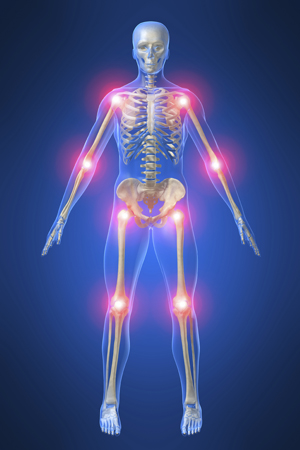 By Dr. Peter H. Diamandis
By Dr. Peter H. Diamandis
Dr. Peter H. Diamandis is the Chairman & CEO of XPRIZE
The staid world of diagnostic testing is about to undergo a major disruption with huge advances in sensors and sensing technologies that live in or on our bodies, within our homes and offices, and even within our computers and networks.
Today we're witnessing a massive shift in who will collect and control diagnostic and other health information. For the first time, as people and patients, we will have control over what we measure, when we measure it, and who has access to our personal data. This is made possible by a new generation of revolutionary biosensors that contain the power of clinical lab instruments in packages that are light, small, wireless and highly efficient.

This is a new world of sensors: they can be body-attached, monitor our immediate personal environment, or even work as pure software apps that extrapolate data from our health records. Using simple, non-invasive methods to take samples of tiny amounts of blood, traces of skin tissue, breath droplets or an image of the inner eye are just some of the new methods emerging. It is exciting to consider that several of these multifunctional sensors, working in concert with powerful mobile handhelds, offer us extraordinary data collection and diagnostic tool sets that will put us in touch with our health in ways never imagined before.
These advances in health sensing, available any time and anywhere, are game changing. A continuous stream of personalized health data will transform how doctors interact with their patients to address and solve health challenges. More importantly, it puts patients at the center of the care process. Personalized data means that specific therapies or drugs will be more effectively delivered and controlled, allowing doctors to fine-tune treatments and watch incremental physiological changes as they occur. This technology will also disrupt the clinical diagnostics business by moving testing from specialized (and expensive) labs to pharmacies and then ultimately to our homes.
Sensors can keep people healthier and reduce emergency room visits - they can anticipate a health problem before it becomes a crisis that demands emergency care. Emergency room admissions are one of the single biggest cost drivers in health care services in North America. Sensors can dramatically impact those costs as part of a health care early warning system.
Vinod Khosla, founding CEO of Sun Microsystems and whose passion is the intersection of technology and medicine, recently commented that "in the next 10 years, data science and software will do more for medicine than all of the biological sciences together." Much has been said about how big data analytics will revolutionize health care, but where will all that the data come from? How do we qualify it and aggregate it for analytical processing?
It's not hard to imagine that health data, in an anonymized form, will become available on the cloud for medical research. Imagine the advances we could achieve by analyzing the health patterns of millions of people that are grouped by their specific conditions, treatments and perhaps even their genomes. This big data approach to health care is widely predicted, and its impact will be enormous. "The area I'm most excited about is the kind of technology, together with sensors and wearables, changing the practice of health care," Vinod noted in a recent interview at TechCrunch Disrupt SF. I could not agree more!
That is why we embarked on the $2.25 million Nokia Sensing XCHALLENGE, consisting of two consecutive competitions to advance innovative sensing technologies that capture meaningful data about a consumer's health and surrounding environment. With this competition, XPRIZE opens the door to a new generation of clinical-grade health sensors that enables an overdue revolution in health care.
This week at the Health 2.0 Fall Conference, XPRIZE will be announcing the winners of the first competition. Registration for the second competition is open through February 2014 at www.nokiasensingxchallenge.org.
We hope that you will follow the Challenge and join us in this amazing journey to "Make Sense of Your Health."
Visit XPRIZE at xprize.org, follow us on Facebook, Twitter and Google+, and get our Newsletter to stay informed.